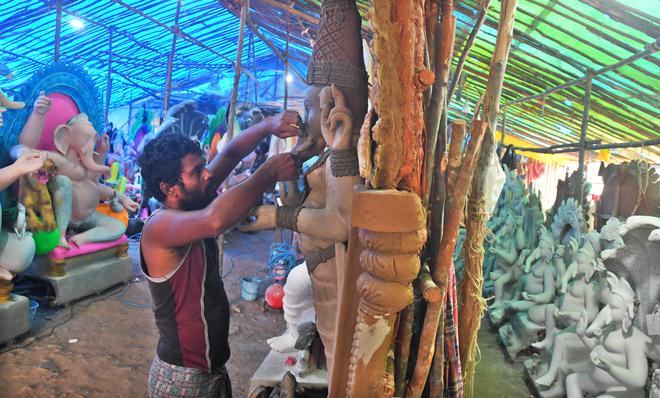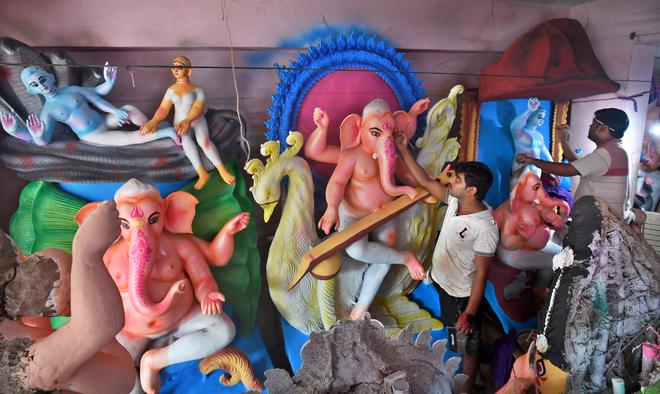Rows of Ganesha idols await the final touches at a workshop at R P Peta Mahatma Gandhi Grandhalayam in Visakhapatnam.
Bending over a four-feet idol, Malay Khanra delicately paints the eyes. At a corner, another man carves flower patterns out of wet clay to be used as ornaments for the idols. Beside him, another one is engrossed in covering the figures with a coat of clay.
The place smells of a concoction of wet earth, fresh paint and spices. Amidst the silence of the dimly-lit workshop, an elderly man sits and chops vegetables, occasionally stirring an earthen pot placed on a stove.
After a gap of two years, Malay Khanra has returned to the city along with 12 other idol makers from West Bengal to continue a decades old tradition of making clay idols. They travel a thousand kilometres every year to give shape to a devotion that is the centre of celebration in this part of the country. The pandemic had halted their journey in the last two years.

This year, the festive buzz is gradually picking up as Visakhapatnam gears up to celebrate Vinayaka Chavithi in 10 days time. And the demand for Kolkata’s clay Ganeshas made by Bengali idol makers is picking up. However, idol makers are observing more demand for the smaller idols this year.
“We have made 200 clay idols this year, more than half of them are the smaller ones. Normally we used to make only 30 such small idols. Rest of the idols used to be 10 feet and above high,” says Sarakam Murthy, who manages the workshop at R P Meta.

Most of the idols at his workshop are of five feet and less in size. “People want to be cautious this time as in the last two years there were a lot of restrictions put in place due to the pandemic. Most of the orders from gated communities and apartments are for small idols. It is also easier to carry out the immersion at the place of worship and gives out a positive message of celebrating the festival in a clean and green way,” says Murthy.
After battling a financial crisis in the past two years, the idol makers from West Bengal are happy to be back. The rising cost of raw materials are, however, a cause of concern. “Cost of clay has gone up substantially and on top of that there is clay shortage as well,” rues Malay. Murthy also says that the cost of a tonne of clay has gone up: it is ₹ 20,000 this year. “It used to be ₹ 3,000 just a year before the pandemic. We cannot pass on the cost to the buyers in an already cautious market mood. So the profit margins are hit,” says Murthy.
Many of the idols from his workshop will travel to other parts of Andhra Pradesh like Vijayawada, Kakinada, Srikakulam, Vizianagaram, Bobbili, Narsipatnam, Nakkapalle and Rajahmundry.

Outside the workshop, a nine feet idol of Ganesha is getting ready, where the elephant-headed God sits on the Garuda. Four Bengali idol makers have been deputed with the herculean task of completing this minutely carved idol that needs to be completed in the next four days. “This is a special idol from a pandal at Boyapalem which will participate in a colony competition. And our idols have a reputation of winning the competition for the delicate craftsmanship,” says Murthy.
Near Waltair Depot at Lawsons Bay Colony, Gautam Sen gives finishing touches to a 12 feet high clay idol. This is the tallest idol at the workshop. “We use two kinds of clay, one from the banks of Ganga that comes from West Bengal and other that is locally procured. The finishing of clay idol is much better, but it is costlier too,” says Gautam.
Here, nine idol makers from West Bengal work from the early hours of the day till midnight, taking two meal breaks, to complete the orders as the festival approaches. Nitai Charan Bhui listens to a Bengali song on his phone as he works on an idol. “I am relieved to be back,” says Nitai. Last year, he had to work as a cook at a home at Anandapuram near Visakhapatnam for three months after the festival restrictions were imposed. “Thankfully I am good at cooking and enjoy it. I cook at home too once I go back after the festive months are over. This skill helped me survive through the challenging times. But nothing gives me more joy than sculpting idols from clay. This is what I have been doing along with my family from the age of 12,” says Nitai.
Even as Visakhapatnam sees a growing trend of small clay idols, the city is also getting ready to see a massive 89-foot clay Ganesh idol being installed at Lanka Grounds at Gajuwaka. The idol is being made by noted sculptor Chinnaswamy Rajendran, who has been designing and building the famous Khairatabad idol in Hyderabad since 1978. Around 60 workers are working on the idol, which is said to be one of the tallest in the country this year.






